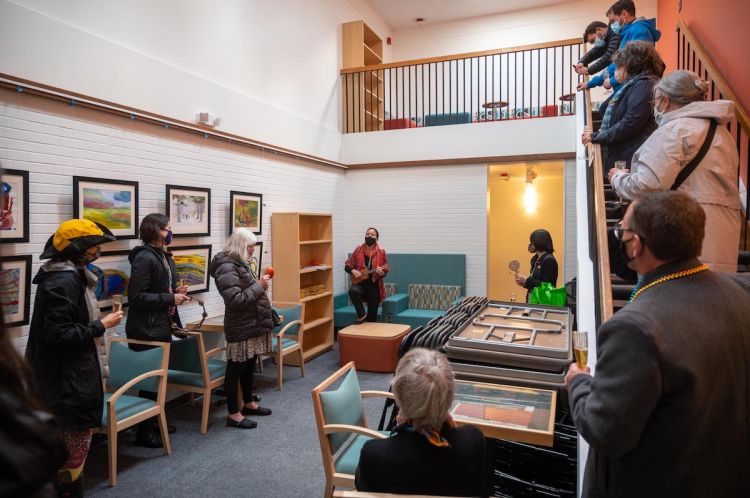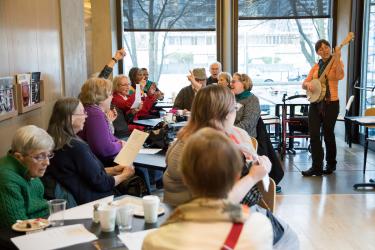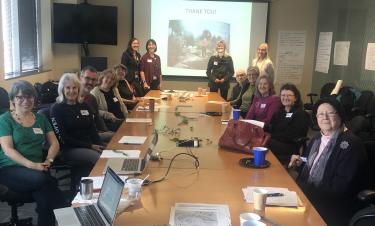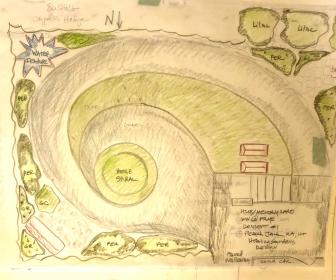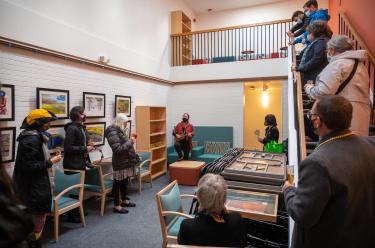As published in Dimensions Magazine - Winter/Spring 2022
Download PDF of this article
The Memory Hub started as a big dream. It was a dream to create a home for the support, education, and engagement programs that the UW Memory and Brain Wellness Center offers for people with memory loss and their families—a warm, welcoming, and non-clinical place, where someone with memory loss is a person, not a patient or research participant. Over time, the dream expanded to involve a vibrant group of partner organizations, and a vision to spread dementia-friendly programs from Seattle across the state!
The Memory Hub: A Place for Dementia Friendly Community, Collaboration, and Impact is finally opening its doors at a Grand Opening on March 23, 2022! This unique community center aims to make the memory loss journey less daunting and to improve quality of life for people with memory loss and their families by providing resources and activities, in a community of support.
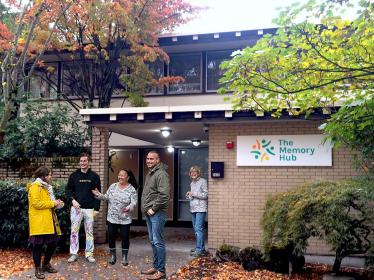
Outside the Memory Hub in January of 2022. Our partners at WSU Institute of Research and Education to Advance Community Health (IREACH) visited to take a tour!
The UW Memory & Brain Wellness Center has long been committed to building dementia-friendly communities, alongside our partners. What is a dementia-friendly community? It is a neighborhood, town, or city which people with memory loss and their loved ones are respected and included and can participate confidently in community life. Local efforts to build dementia-friendly communities abound, from dementia-friendly walking groups with Seattle Parks and Recreation, to the Frye Art Museum’s Creative Aging programs for people living with dementia and their families. Now, people living with memory loss, alongside others involved in the dementia-friendly community movement, have a physical place – the first of its kind – to gather, create, network, and bring visibility to these efforts.
“Community can be the difference between despair and hope — the feeling that you can get through this,” says Marigrace Becker, program manager for community education and impact, and the director of the Memory Hub. “By creating the Memory Hub, we are ensuring that people with dementia are woven into the fabric of community life, rather than sidelined and forgotten.”
The benefits of dementia-friendly community are known best by its local members. “Having a community that is not afraid of Alzheimer’s disease is priceless,” says caregiver Carla Griswold, who is a MBWC community advisory group member alongside her spouse Kirk. “Within this community, we have learned how to live with Alzheimer’s, and we have made lifelong friends. We sustain each other. I cannot imagine traveling this road without them.”
A matching gift from the Richard and Maude Ferry Charitable Foundation turned the dream for the Memory Hub into a reality. We are also grateful for the many generous gifts from individuals, foundations, and organizations. A complete list of all Memory Hub donors appears at the end of this article.
“I am excited about the Memory Hub,” says Richard M. Ferry, founding donor for the project. “I think Marigrace Becker is going to bring together a cohort of talented people from different organizations to make this a national model for innovation in dementia programs and support for many folks in this community, as well as in the country and maybe globally.”
Conveniently located in Seattle’s First Hill neighborhood, the Memory Hub is housed in a building owned by our founding community partner the Frye Art Museum. “It’s not just that the Frye Art Museum is geographically close, it’s that they’re philosophically close to us,” said Thomas Grabowski, MD, director of the UW Memory and Brain Wellness Center.
For ten years, the Frye Art Museum has offered Creative Aging programs for adults to engage in creative lifelong learning, including accessible gallery discussions and artmaking workshops for people living with memory loss and their care partners. “This is a unique collaboration between a memory disorder clinic, our partners and a free art museum. Can you imagine a less stigmatizing environment to build dementia-friendly community?” asks Grabowski.
“Being part of the Memory Hub community brings new opportunities for collaboration with like-minded organizations and individuals dedicated to bringing joy, respect, and dignity to people living with dementia while destigmatizing the disease,” says Mary Jane Knecht, Manager of Frye Art Museum Creative Aging Programs. As a Memory Hub on-site collaborator, the Frye will co-sponsor the monthly Alzheimer’s Café event and support other art-related activities.
When visitors enter the Memory Hub, they will find a gathering space, lecture hall, gallery of art made by persons with memory loss, a memory loss resource center/library, an arts-based adult day program, a care consultant to assist with navigating community resources, a memory garden, and so much more. Our on-site collaborator organizations helped to create this wide array of features and resources. The Memory Hub also offers program and event space to other organizations that want to support the well-being of people with memory loss and families.
Read on to learn more about what makes the Memory Hub a vibrant place of community, collaboration, and statewide impact.
Explore the Memory Hub!
The Memory Hub brings staff from our on-site collaborator organizations together to co-locate under one roof, to offer wellness and support programs for the community. For example, Elderwise, a local adult day program, is offering its structured program of arts, exercise, discussion, and shared community for people with dementia, which provides respite for caregivers. Full Life Care is running Dementia Training for Family Caregivers, an evidence-based virtual and in-person course with individualized coaching that helps family members better support their loved ones. And thanks to generous limited parking offered by our neighbor Murano Senior Living, programs will be easy to access.
The Memory Hub finally provides a home base for UW MBWC strengths-based and dementia-friendly programs, especially ones that require a large activity space. “It’s been incredibly important for me to make our programs and services as accessible as possible, which includes taking them out of a medical or hospital setting when appropriate,” says Kris Rhoads, PhD, associate professor of UW Neurology and founding member of the Memory Hub. “While we’ve benefitted from the kindness and generosity of others offering their space for our group lifestyle and behavioral intervention, ADAPT (Applied Daily Activities to Promote Thinking), having a permanent home for the program will enable us to optimize the format and schedule in ways that would otherwise be impossible.”
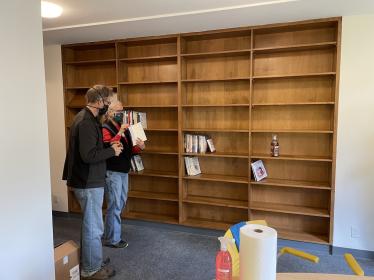
Volunteers Karen and Scott help arrange the Memory Hub library in November of 2021.
The Tech Lab at the Memory Hub is a brand-new addition thanks to MBWC neuropsychologist Carolyn Parsey, assistant professor of UW Neurology. This program will offer regular hands-on consumer technology demonstrations for people with memory loss and care partners, and trainings to learn how technology can promote social connection, emotional and physical wellness, and independent living.
Regularly offered Memory and Brain Wellness Center community programs and events will remain a hybrid between in-person at the Memory Hub and virtual format on Zoom for the time being. You can explore all the offerings and updates on our new website: www.thememoryhub.org.
Thanks to the Alzheimer’s Association, a memory navigator will be available during open hours to provide resources to people with memory loss and caregivers. “So many individuals and families that receive a memory loss diagnosis or are experiencing memory loss don’t know where to go,” says Em Brulotte, Helpline Coordinator and Care Consultant at the Alzheimer’s Association, who will fill this on-site role. “The Memory Hub creates a space where the guidance of next steps and support can be established—a place where the concerns, needs, and the journey that is memory loss are at the forefront.”
Frame of Mind: A Gallery of Artwork Created by People Living with Dementia
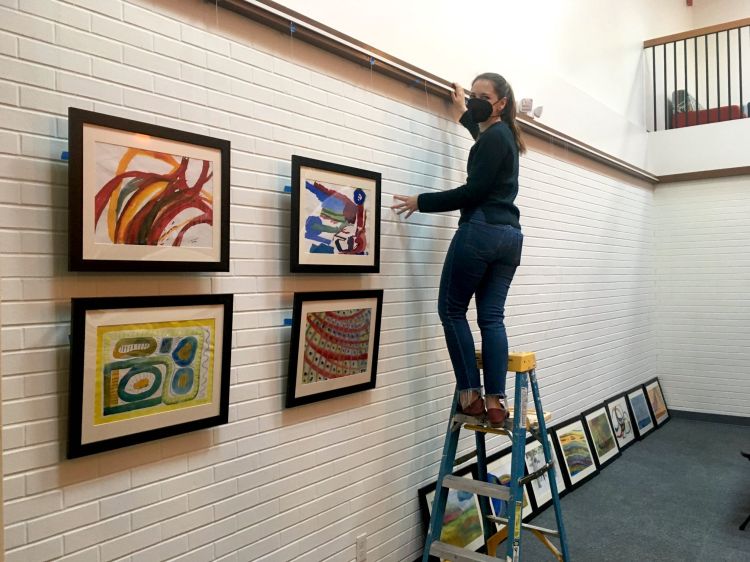
Lindsay Waltner from Elderwise hangs the inaugural 'Frame of Mind' exhibit at the Memory Hub.
The Memory Hub features the ‘Frame of Mind’ exhibit, a rotating quarterly art gallery of works created by people living with dementia. The art currently on display was created by the participants enrolled in the Elderwise adult day program in the early spring of 2020.
The Elderwise artists used a wet-on-wet watercolor technique for these works, painting with watercolor paint on wet paper. This method encourages the paint to flow across the paper in exciting, unpredictable patterns and works well for a variety of ability and experience levels. For this exhibit, Elderwise staff selected at least one painting from each participant, based on its representation of the artist’s own personal style and way of using color.
Lindsay Waltner, program coordinator and a program facilitator for Elderwise, witnessed the creation of the art and recently helped install the inaugural show. “The participants had such wonderful camaraderie, and each individual came to the table with an open heart and so much kindness,” says Waltner. “Because I had the privilege of spending time with the artists as a program facilitator, I loved being able to revisit the paintings while working on this show because each painting reminds me of the person who created it. My hope is that the gallery brings people joy and that the array of artistic styles among the paintings will celebrate the unique beauty that people with memory loss can share with us. The Elderwise artists show us that we can continue to express who we are regardless of physical or cognitive changes.”
The gallery is now viewable on our website’s virtual gallery and at the Memory Hub during business hours starting this spring.
Statewide Impact Initiatives
While a variety of memory loss programs and initiatives thrive in urban areas like Seattle, people with memory loss and their families, and practitioners, in other parts of the state regularly ask, “what about us?” There has yet to be a place focused primarily on training related to dementia-friendly communities, spreading best programs and practices from Seattle around the state.
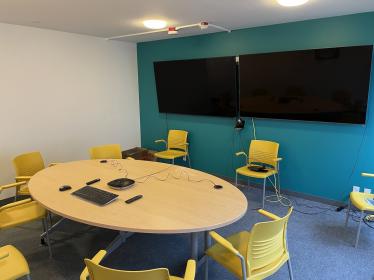
the Memory Hub’s on-site Zoom room
The Memory Hub is positioned to drive statewide impact, working in alignment with other broad efforts such as the Dementia Action Collaborative, a partnership implementing the Washington State Plan to Address Alzheimer’s and Other Dementias. We also closely partner with Momentia, a grassroots movement empowering people with memory loss and families to stay active and connected in the community. To inspire and equip other communities to offer strengths-based programs and dementia-friendly initiatives, we’ll offer trainings on program implementation, opportunities to observe programs, consulting and advice, and an annual symposium.
Hosted in the Memory Hub’s on-site Zoom room, the Dementia-Friendly Washington Learning Collaborative meets online every month to support expansion of dementia-friendly community efforts, learning from and sharing with each other around a common theme. The Memory Hub will also provide a home base for Dementia Friends, a public awareness project working to build understanding and remove the stigma that people with memory loss and their care partners face. Dementia Friends trains volunteers to give an hour-long community information session about what it’s like to have dementia, and how to be supportive to neighbors, friends and family members who live with dementia.
At the heart of our effort to help improve dementia care is Project ECHO Dementia, a web-based videoconferencing learning model for frontline care providers from Washington State. “The Memory Hub’s partnership with the Dementia Action Collaborative is fundamental to our mission of driving statewide impact,” says Kris Rhoads. “I’m especially excited to have a state-of-the-art home for Project ECHO Dementia, our virtual telementoring clinic designed to help primary and specialty care providers from around the state to diagnose and care for individuals and families living with memory loss and dementia.” Learn more about the programs for professionals.
Maude’s Garden: A Nature Sanctuary for Joy, Healing, and Learning at the Memory Hub
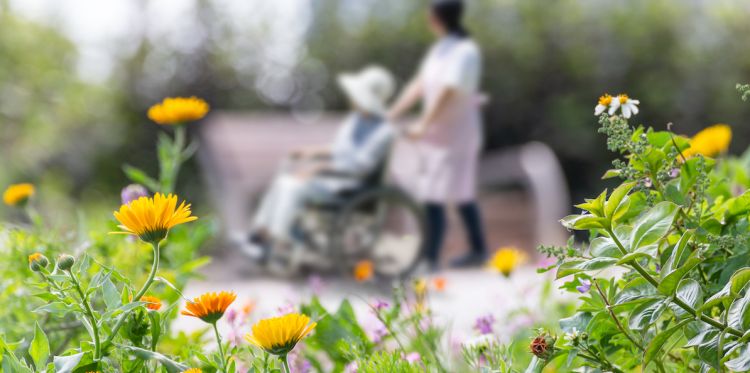
Shutterstock
Inspired by the interest in nature experiences in our community, the Memory and Brain Wellness Center is creating Washington State’s first public memory garden for people living with dementia. Maude’s Garden is named in honor of the late community advocate and philanthropist Maude M. Ferry, beloved spouse of our founding donor Richard M. Ferry. This botanical garden on the grounds of the Memory Hub is uniquely designed to enhance the lives of people living with dementia, as well as provide a relaxing, restorative space for all.
The garden will serve as a spot for drop-in gardening, socializing, and nature-based activities, such as horticultural therapy and an adaptation of the Garden Discovery Walks program. We are thrilled to be working with Stone Soup Gardens, a sustainable local landscape company, to build the garden infrastructure. They are leaving all of the planting to us!
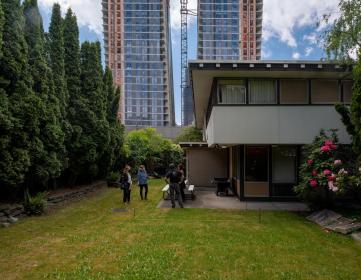
The space before garden building started in January of 2022!
Maude’s Garden has an interesting origin story in the Garden Discovery Walks, a program the UW Memory and Brain Wellness Center offers in partnership with Seattle Parks and Recreation. From 2017 to 2020, the program involved a monthly in-person tour of a local public garden followed by a creative, nature-inspired activity.
“The gardens we visited were incredibly welcoming and always full of beautiful surprises,” says Genevieve Wanucha, science writer at the UW Memory and Brain Wellness Center and green space project lead for the Memory Hub. “But we began to imagine having one special garden that would pose no unexpected barriers to accessibility and provide a familiar, dependable environment and feeling of belonging for people living with memory loss. We dreamed of a botanical sanctuary that our community could have a hand in designing and tending.”
The green space behind the Memory Hub became the perfect location for the envisioned memory garden. The garden design process, over the last two years, has incorporated feedback from community members living with memory loss and care partners, as well as lessons learned from the Garden Discovery Walks program and a visit to our friends at the Portland Memory Garden. We are excited for a new community partnership with the team at the Bloedel Reserve on Bainbridge Island, who will contribute advice and feedback on our planting plan.
We are incredibly grateful to our community donors who made major financial investments in this garden. Their generosity ensures that Maude’s Garden will reach its fullest potential as a source of joy, healing, and learning for the local memory loss community. Learn more about Maude’s Garden.
Welcome to the Memory Hub!
We are excited to finally welcome people into this new space. We are offering small group tours of the Memory Hub this winter, leading up to a Grand Opening event on March 23, 2022. All events and programs will follow current COVID-19 guidelines. Check out this website to find our calendar, updates, news, and links to register for programs and events.
The Memory Hub models what a community of support looks like for people with dementia and memory loss, but it also depends on the community’s ongoing involvement. Its success depends on other visionary donors who understand the importance of supporting people with memory loss and their families at every step of the journey.
The Memory Hub team is grateful for the moral and practical support of the MBWC team, the MBWC community advisory group, on-site collaborators especially founding partner the Frye Art Museum, support of UW Medicine leadership, UW Advancement, UW Real Estate, UW IT, web designer Jonathan C. Henriksen, Memory Hub Experience Designer Cal Dobrzynski, our funders, and our memory loss community members who tirelessly cheer on the Memory Hub.
“I am so looking forward to walking through the bright halls of the Memory Hub to meet even more people on this journey,” says caregiver Carla Griswold. “It will offer a sigh of relief, a balm to the chaos we live with every day. I can’t wait.”
Visit the new Memory Hub website at www.thememoryhub.org.
For questions, please contact the director of the Memory Hub, Marigrace Becker: 206-744-2190, mbecker1@uw.edu. •
Thank you to the people and organizations who donated funds to support the Memory Hub!
Richard M. and Maude M. Ferry
The Richard and Maude Ferry Foundation
Charlotte H. Merritt
The Frederick Foundation
The Anderson Foundation
Emerald Heights Retirement Community
Paul R. and Phyllis A. Seegers
Carl Westphal
Aaron J. and Gwen Colwell
Peter W. and Merle Mullin
Peter W. Mullin Family Charitable Foundation
Debby and Kristian B. Hanssen
Epstein Family Foundation
California Community Foundation
Elissa and John DiCarlo
Blake Eagle
Richard A. and Marylou J. Ferry
Cheryl Guenther
James I. Melhorn
William and Helen Close Family Foundation
Catholic Community Foundation of LA
Eli J. and Rebecca Almo
George A. and Karen J. Bray
Charles F. Friedel
Donald Desalvo and Susan Wagner
Suzanne M. Hittman
Gary Krauss
Patricia Klingler
Diana and Bob Sarussi
Evelyn C. Sroufe
Ray Atkins
H. Glenn Bell, Jr.
Sam and Martha Casne
David A. Kane
Raynard and Charlotte Kanemori
Richard H. Kost
Atidtha Pinbang
Michael E. and Diana S. Prise
Denise Truxal
Alan D. Findlay
Mary and Michael W. Hunstad
Karen I. Millward
Kevin Brown
Phyllis R. Stern
Gail Eileen Efroymson

